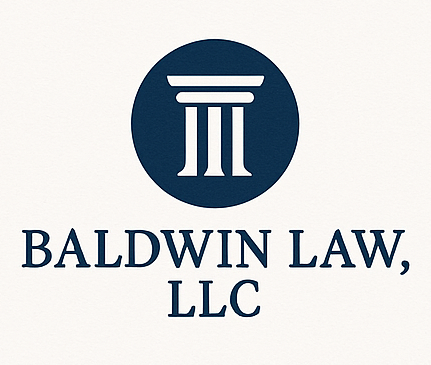Understanding Chapter 7 Bankruptcy: A Fresh Start for Consumers By Robert Baldwin, Esq. | Baldwin Law, LLC
When financial obligations become overwhelming, many individuals and families feel trapped with no way out. Chapter 7 bankruptcy, often referred to as “liquidation bankruptcy” or a “fresh start bankruptcy,” is a legal tool designed to help honest debtors get relief from burdensome debts and regain control of their financial future.
What Is Chapter 7 Bankruptcy?
Chapter 7 bankruptcy is a process under federal law that allows individuals (and some businesses) to discharge most unsecured debts—such as credit cards, medical bills, personal loans, and certain judgments. Unlike other forms of bankruptcy, Chapter 7 does not require a repayment plan. Instead, a court-appointed trustee may sell (or “liquidate”) certain non-exempt assets to repay creditors.
However, in most consumer cases, the debtor’s property is protected by exemptions, meaning they are able to keep essential assets like household goods, a modest vehicle, and in many states—even their home.
Who Qualifies for Chapter 7?
To qualify for Chapter 7 bankruptcy, you must pass the Means Test, which compares your income to the median income in your state. If your income is below the median, you typically qualify. If it is higher, additional calculations may be required to determine eligibility based on allowable expenses and debts.
Chapter 7 is generally available to:
Individuals
Married couples filing jointly
Sole proprietors (for business debts)
It is not typically available for corporations or partnerships.
What Debts Are Discharged in Chapter 7?
The most common debts discharged in Chapter 7 include:
Credit card balances
Medical bills
Personal loans
Payday loans
Certain past-due utility bills
Certain judgments
However, some debts are non-dischargeable, including:
Recent taxes
Student loans (except in rare cases of hardship)
Child support and alimony
Debts arising from fraud or intentional wrongdoing
The Chapter 7 Process – At a Glance
Pre-Filing Credit Counseling – Complete a court-approved credit counseling course.
Petition Filed – Your attorney files your bankruptcy petition, listing all debts, assets, income, and expenses.
Automatic Stay Begins – Creditors must immediately stop collection efforts, wage garnishments, and lawsuits.
341 Meeting (Meeting of Creditors) – You meet with the trustee (and possibly creditors) to answer questions about your finances.
Discharge Granted – Typically within 3-6 months, eligible debts are legally wiped out.
How Chapter 7 Can Help You
Eliminates crushing unsecured debts
Stops creditor harassment and collection lawsuits
Halts wage garnishments and bank levies
Provides peace of mind and a clean financial slate
Is Chapter 7 Right for You?
Chapter 7 can be a powerful tool, but it’s not the right fit for every situation. It’s important to understand the impact on your credit, your obligations, and your long-term financial goals.
